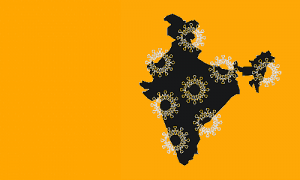Both the Pfizer and AstraZeneca COVID-19 vaccines showed effectiveness against symptomatic disease from the so-called Indian variant, with the Pfizer showing 88% efficacy after two doses and AstraZeneca's 60%, writes MedicalBrief.
Vaccine effectiveness after one dose against B.1.617.2 was similarly low for both vaccines, at 33%.
The study from Public Health England, released as an online preprint, is the first study to report on vaccine effectiveness against the B.1.617.2 variant, the authors write.
"The findings suggest a modest reduction in vaccine effectiveness," the authors wrote. "Nevertheless, a clear effect of both vaccines was noted with high levels of effectiveness after two doses."
Limitations to the data include that this was an observational study, so unmeasured confounders are possible, such as differences in populations that received each vaccine. They also noted low sensitivity or specificity of PCR testing could have misclassified individuals as being positive or negative.
Study details
Effectiveness of COVID-19 vaccines against the B.1.617.2 variant
Authors: Jamie Lopez Bernal, Nick Andrews, Charlotte Gower, Eileen Gallagher, Dr Ruth Simmons, Simon Thelwall, Julia Stowe, Elise Tessier, Natalie Groves, Gavin Dabrera, Richard Myers, Vanessa Saliba, Shamez Ladhani, Colin Campbell, Gayatri Amirthalingam, Matt Edmunds, Maria Zambon, Kevin Brown, Susan Hopkins, Meera Chand, Mary Ramsay.
Published as an online preprint on 22 May 2021
Abstract
Background
The B.1.617.2 COVID-19 variant has contributed to the surge in cases in India and has now been detected across the globe, including a notable increase in cases in the UK. We estimate the effectiveness of the BNT162b2 and ChAdOx1 COVID-19 vaccines against this variant.
Methods
A test negative case control design was used to estimate the effectiveness of vaccination against symptomatic disease with both variants over the period that B.1.617.2 began circulating with cases identified based on sequencing and S-gene target status. Data on all symptomatic sequenced cases of COVID-19 in England was used to estimate the proportion of cases with B.1.617.2 compared to the predominant strain (B.1.1.7) by vaccination status.
Results
Effectiveness was notably lower after 1 dose of vaccine with B.1.617.2 cases 33.5% (95%CI: 20.6 to 44.3) compared to B.1.1.7 cases 51.1% (95%CI: 47.3 to 54.7) with similar results for both vaccines. With BNT162b2 2 dose effectiveness reduced from 93.4% (95%CI: 90.4 to 95.5) with B.1.1.7 to 87.9% (95%CI: 78.2 to 93.2) with B.1.617.2. With ChAdOx1 2 dose effectiveness reduced from 66.1% (95% CI: 54.0 to 75.0) with B.1.1.7 to 59.8% (95%CI: 28.9 to 77.3) with B.1.617.2. Sequenced cases detected after 1 or 2 doses of vaccination had higher odds of infection with B.1.617.2 compared to unvaccinated cases (OR 1.40; 95%CI: 1.13-1.75).
Conclusions
After 2 doses of either vaccine there were only modest differences in vaccine effectiveness with the B.1.617.2 variant. Absolute differences in vaccine effectiveness were more marked with dose 1. This would support maximising vaccine uptake with 2 doses among vulnerable groups.

